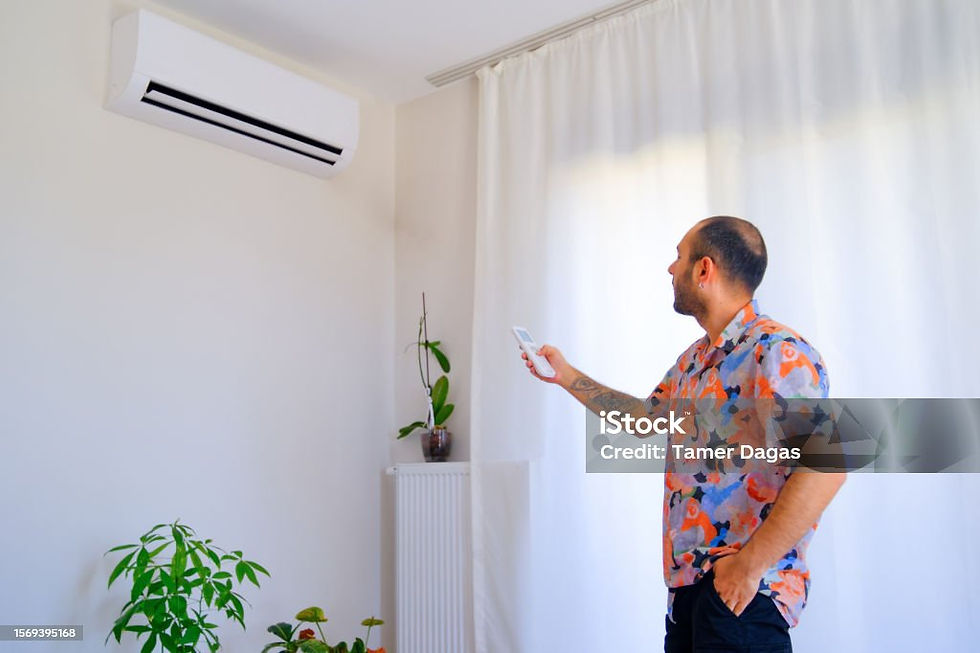Optimizing Indoor Air Quality with Effective Ventilation Systems
- davidgrace1416
- May 26, 2024
- 2 min read
Ventilation systems are integral components of HVAC (Heating, Ventilation, and Air Conditioning) systems. They play a vital role in maintaining indoor air quality (IAQ) by regulating airflow and removing pollutants. Proper ventilation not only ensures comfort but also contributes to the overall health and well-being of occupants.

Types of Ventilation Systems and Their Functions
There are several types of ventilation systems commonly used in residential and commercial buildings:
Natural Ventilation: Relies on natural airflow through windows, doors, and vents to circulate fresh air and expel stale air.
Mechanical Ventilation: Utilizes fans or blowers to actively ventilate indoor spaces, either through exhaust or supply systems.
Whole-House Ventilation: Provides continuous ventilation throughout the entire home, ensuring consistent airflow and IAQ.
The Role of Ventilation in Combating Indoor Air Pollution
Indoor air pollution poses significant health risks, including respiratory problems, allergies, and even cardiovascular issues. Effective ventilation helps mitigate indoor air pollution by diluting and removing airborne contaminants such as:
Volatile Organic Compounds (VOCs): Emitted from household products, building materials, and combustion sources.
Particulate Matter: Includes dust, pollen, mold spores, and other fine particles that can trigger respiratory problems.
Carbon Monoxide (CO): A colorless, odorless gas produced by incomplete combustion, posing a serious health hazard.
Integrating Ventilation Systems with AC for Optimal IAQ
Ventilation systems work synergistically with air conditioning (AC) systems to maintain comfortable and healthy indoor environments. By integrating ventilation with AC, occupants can enjoy:
Improved Air Circulation: Proper ventilation ensures consistent airflow, preventing stagnation and maintaining fresh indoor air.
Humidity Control: Mechanical ventilation systems can help regulate indoor humidity levels, reducing the risk of mold and mildew growth.
Energy Efficiency: Well-designed ventilation systems complement AC operations, enhancing energy efficiency and reducing utility costs.
Importance of Regular Maintenance and AC Service for Ventilation Systems
To ensure the optimal performance of ventilation systems, regular maintenance and AC service are essential. Neglecting maintenance can lead to:
Clogged Filters and Ducts: Accumulated dirt and debris restrict airflow, reducing ventilation effectiveness.
Mechanical Failures: Faulty components or worn-out parts can compromise ventilation system functionality.
Poor IAQ: Inadequate ventilation due to lack of maintenance can result in indoor air quality issues and discomfort for occupants.
Tips for Enhancing Ventilation and IAQ in Your Home
Homeowners can take proactive steps to improve ventilation and IAQ:
Install Exhaust Fans: In kitchens, bathrooms, and other high-moisture areas to remove indoor pollutants and excess humidity.
Use Air Purifiers: Supplement ventilation with air purifiers equipped with HEPA filters to capture airborne contaminants.
Seal Leaks and Gaps: Ensure windows, doors, and ductwork are properly sealed to prevent outdoor pollutants from entering the home.
Schedule Routine Maintenance: Regularly inspect and service ventilation systems, including AC units, to maintain peak performance and IAQ.
Effective ventilation is essential for maintaining healthy indoor air quality and ensuring occupant comfort. By understanding the role of ventilation systems and integrating them with AC operations, homeowners can create a conducive indoor environment that promotes well-being. Investing in regular maintenance and AC service helps maximize the performance and longevity of ventilation systems, contributing to a healthier and more comfortable living space.



Comments